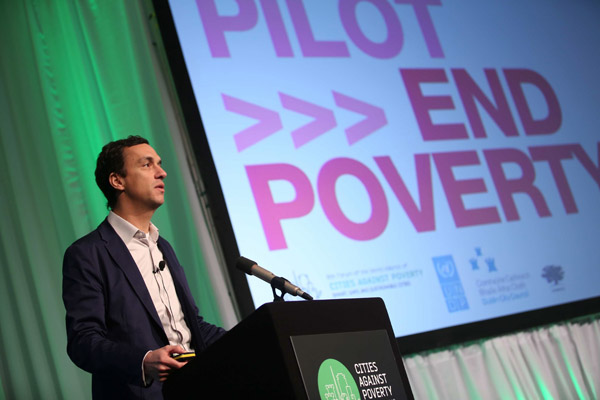Sally Fegan-Wyles, executive director, UNITAR, who spoke at the World Alliance of Cities Against Poverty conference in Dublin this morning. Image via Jason Clarke Photography
Up to 600 delegates from all over the world are convening in Dublin this week for the eighth forum of the World Alliance of Cities Against Poverty (WACAP) to explore how cities can tackle poverty and to look at areas such as how cities can become smarter, safer and more sustainable by harnessing technology.
The two-day conference kicked off yesterday at the RDS in Dublin. WACAP itself is a network of more than 900 cities working together to confront urban challenges, such as poverty. Delegates, ranging from city mayors, local governments and entrepreneurs from the private sector, have been thrashing out ideas on how to make cities smarter and safer, as well as how to address urban poverty.
This morning, Peter Finnegan, a director of international relations at Dublin City Council, launched a session to look at public and private collaboration in developing smarter cities.
He said cities must increasingly look at the interface of innovation and technology in reducing poverty in cities.
Digital poverty
Firstly, he introduced a PhD project from the Innovation Academy, an academic alliance between Trinity College Dublin (TCD), University College Dublin and, more recently, Queen’s University Belfast (QUB).
Four PhD students from the three universities carried out a two-week project with Dublin City Council, with the aim of thinking creatively about digital poverty.
Adam Bargroff, a PhD student at QUB, took to the stage to explain the concept the students came up with to look at digital poverty.
“We scaled down our idea to think about digital literacy,” he said.
The students came up with a concept for an application called ‘ReadWrite’ that would use speech-to-text and text-to-speech software to help educate people.
Effective partnerships
Irish-born Sally Fegan-Wyles, the executive director of the United Nations Institute for Training and Research (UNITAR), then spoke about creating effective partnerships to create prosperous cities.
Before her current role at UNITAR, Fegan-Wyles was senior adviser in the Office of the Deputy Secretary-General, where she led the inter-agency team that prepared the blueprint for the United Nations Entity for Gender Equality and the Empowerment of Women.
This morning, she spoke about the importance of effective partnerships for achieving more prosperous cities.
Public-private collaboration, according to Fegan-Wyles, should enable local governments to better respond to the needs of their communities.
“We need to learn to ask ‘what needs to be done?’, ‘who is best placed to do this?’ and ‘what can I do?'” she explained.
Dublin and sustainability
Intel vice-president Martin Curley, who is director of Intel Labs Europe, a network of more than 40 research labs, then spoke about how three major trends that are emerging: digital transformation, sustainability and mass collaboration.
“We think cities are at the nexus of these three trends,” explained Curley.
Intel Labs Europe is collaborating with Dublin City Council and TCD on a sustainability strategy for Dublin City, which Curley this morning described as a “quadruple helix” strategy.
“What we want to do is think about the innovation trajectory for cities like Dublin to enhance the social, economic and environmental well-being of citizens and the city,” said Curley.
He spoke about finding disruptive technologies to help improve resource efficiencies and services in the city.
Already, Intel is working with TCD and Dublin City Council to develop an urban sensing platform called CityWatch to create a real-time picture of what happens in an urban environment using fixed and mobile sensors.
Edmonton’s zero waste vision
To give an international angle on how other cities are tackling sustainability, Stephen Mandel, the mayor of Edmonton in Canada, spoke about some of the public-private partnerships taking place in the city.
With a population of 900,000 people, Mandel said the plan is for Edmonton to become a zero-waste city.
He said the city reached the end of its capacity for landfill and has since been working with a private utility to develop systems for sustainable waste processing.
Some of the facilities that the Edmonton Waste Management Centre now houses include a materials recovery facility, an electronic waste recycling facility, as well as a facility for composting.
According to Mandel, the city will have the scope to sell its expertise around waste management.
“Our goal is to market our skill sets to other communities around the world about our approach to waste management,” he explained.

Sascha Haselmayer, CEO, Citymart.com. Image via Jason Clarke Photography
Finally, Sascha Haselmayer, the CEO of Citymart.com, took to the stage to give examples of how the initiative connects cities with solution providers. Citymart.com is currently a marketplace of 82 cities and 1,200 providers.
Haselmayer gave the statistic of 90pc of cities do not publish their problems. “We found that when cities open their problems, markets listen and invest,” he said.
Haselmayer gave the example of the city of Barcelona, which came to Citymart.com to look for a technological solution to automate urban services.
Barcelona has picked a solution called Citysolver that is pioneered by a company called Bitcarrier. Citysolver is a platform for real-time traffic monitoring.